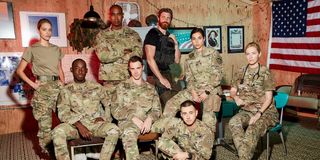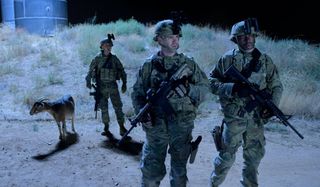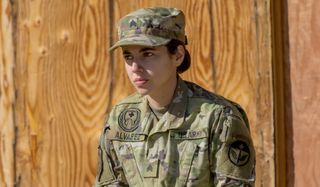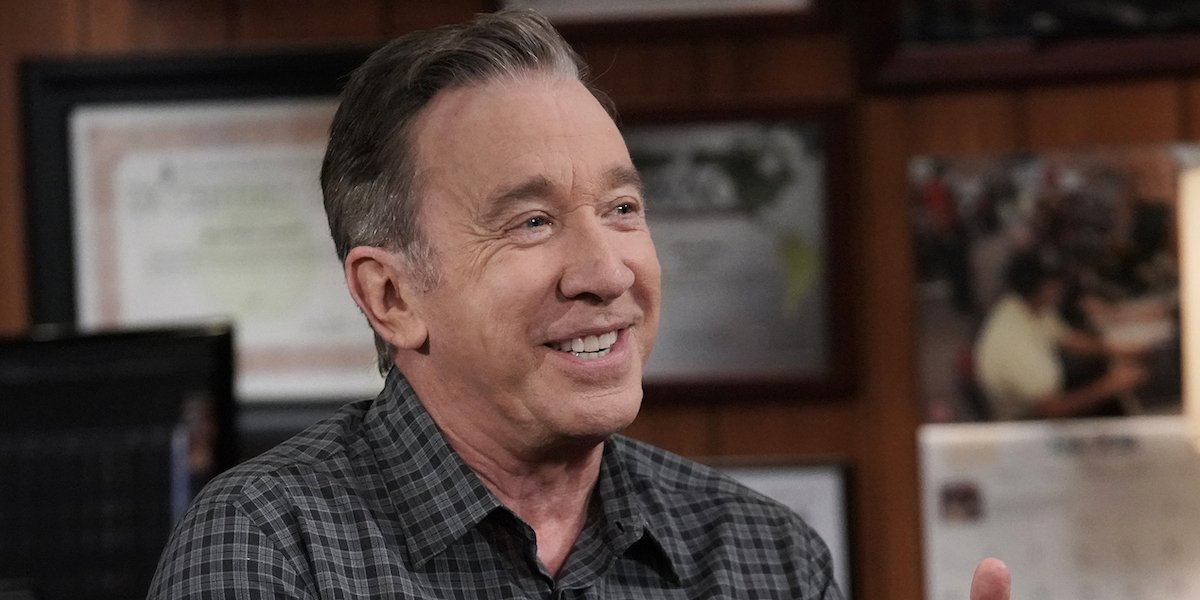68 Whiskey Creator Talks Ron Howard's Influence And Telling A Military Story Without Politics

Hot on the heels of Kevin Costner's breakout TV drama Yellowstone – but set on a completely different continent – Paramount Network's 68 Whiskey centers on a group of Army medics stationed in Afghanistan that do whatever it takes to stay safe and sane. The dramedy recently debuted to the most-watched cable drama premiere since November 2018, so it's clear that viewers are interested in these characters and their oddball, sexed-up predicaments. Which isn't much of a surprise with executive producers like Ron Howard and Brian Glazer.
During this year's Television Critics Association's winter press tour, I spoke with creator Roberto Benabib about bringing 68 Whiskey into a TV landscape where war stories tend to embrace political agendas over human nuances. As well, he shared the key inspiration that Ron Howard gave him when the series was coming together.

Ron Howard's 68 Whiskey Advice
With a career in TV that goes back slightly earlier than his star-making role on The Andy Griffith Show, Ron Howard made a lifelong career partner out of producer Brian Grazer in the early '80s, and their company Imagine Entertainment has produced a library of hit films and series. (Grazer's early career was spent handling TV pilots for Paramount Pictures, so he's right at home on Paramount Network.) That pedigree and experience certainly goes a long way in Hollywood, so I had to ask Roberto Benabib how they helped out during the show's development. In his words:
Well, Ron [and Brian], they opened doors, for one. Beyond that, I think Ron came up with a really good analogy for the show. He said it was like a Thornton Wilder play. It was like Our Town, it's like this base is a community and you start to learn where everyone fits into the base. It's a town where they literally are forced to be here, forced to be together, and have to decide how they're going to live together. Once he kind of codified that for me and pinpointed it, it was a lot easier to know what the show was. Ron Howard tends to do that. He tends to illuminate things like that.
While I'm sure there are a lot of factors that fit inside the "opened doors" descriptor, that's a lot of behind-the-scenes nitty-gritty that presumably greased a wheel or two where budgets and access were concerned. For Benabib, Ron Howard's biggest creative contribution was likening 68 Whiskey's core squad to the classic stage play Our Town, which from the outset gave a unique look at the daily life of residents in Grover's Corners, New Hampshire.
Of course, 68 Whiskey doesn't share Our Town's metatheatrical approach of breaking the fourth wall and jumping through time between acts. Rather, it hones in on the universally relatable trials and tribulations of characters like Sam Keeley's Roback and Gage Golightly's Durkin, who are essential pieces of the army base's communal pie, even if those two in particular tend to tip the scales more to gossip-worthy chaos than peace.

Why 68 Whiskey Isn't Political
Most news stories about the U.S. military are covered with one form of political motivation or another, be it locally bipartisan or something more global. 68 Whiskey's Afghanistan setting could have easily inspired narratives driven by current events, but creator Roberto Benabib and the rest of the creative team weren't so focused on blatantly reflecting real-world headlines back out to audiences. In his words:
Really, what we were focusing on in the show was the characters and, interestingly enough, their situation back home. And what was tearing at them and eating at them and what they were consumed with. Because as I spoke to more and more veterans, what I realized is you don't get to put a pin in your problems back home for 17 months after your deployment, and then they're exactly where you left them. And it weighs on them. So the first thing was, it was an incredible way to deal with what was going on in this country by dealing with the problems that were following them to Afghanistan. Because by doing that, it became very indirect and you didn't feel like you were preaching. There wasn't that kind of element to it. It was just stuff they were living with, that was very much part of the lives, that they had to figure out being 10,000 miles away. So it was a great way to deal with that.
On 68 Whiskey, the big problems aren't due to The Enemy, as it goes with plenty of wartime tales, but many of the same issues the might be facing back home. For instance, Cristina Rodlo's medic Alvarez has to deal with citizenship issues that threaten her Army status, which does speak to hot-button topics such as immigration, but in character-specific ways that avoid name-dropping.
CINEMABLEND NEWSLETTER
Your Daily Blend of Entertainment News
In terms of the overall war-related politics, Roberto Benabib used the classic MAS*H to exemplify how a TV show can approach said subject matter in generalized terms.
And then in terms of war, the fact that MAS*H was really about Vietnam, but set in Korea, kind of lets you know war is war. Not only [that], but our reasons for getting into any war, with the possible exception of World War II, are always in a gray area and murky. Even if they start out righteous, the longer you're in it, the murkier they get. So you find that there's a sameness to these conflicts that allows you to deal with them wherever you kind of plant your flag. In a way, the politics weren't about war. The politics were about inequality. The politics were about the economic pressures that were on these characters who had chosen to serve their country, and what they had to deal with and how these problems, as I said, followed them to Afghanistan. So if there are politics, they're economic and not really diplomatic.
As it goes, the names and faces may change, but the ins and outs of a war will almost always stay the same. Roberto Benabib went a step further in pointing out another way the show shines a light on those murky waters.
On that note, the central conflict on the base is between the army and the private contractors, and so that was even a way to deal with the privatization of [everything]. They'd like to privatized the mail, they liked to privatize everything. Is it better or isn't it? Well, I don't know, but maybe you're better off fighting for God and country and not for profit. So it was also a way to deal with that indirectly, which again puts you in a position where you didn't feel you were preaching, but you were dealing with these issues that are very central to what's going on here now.
Had it been less idiosyncratic in approaching its wartime storytelling, 68 Whiskey probably wouldn't be the highly comedic and humane show that has already attracted millions of viewers. And it almost definitely wouldn't have put so much emphasis on a goat this early in its run. Go Petrocelli!
68 Whiskey airs Wednesday nights on Paramount Network at 10:00 p.m. ET.

Nick is a Cajun Country native and an Assistant Managing Editor with a focus on TV and features. His humble origin story with CinemaBlend began all the way back in the pre-streaming era, circa 2009, as a freelancing DVD reviewer and TV recapper. Nick leapfrogged over to the small screen to cover more and more television news and interviews, eventually taking over the section for the current era and covering topics like Yellowstone, The Walking Dead and horror. Born in Louisiana and currently living in Texas — Who Dat Nation over America’s Team all day, all night — Nick spent several years in the hospitality industry, and also worked as a 911 operator. If you ever happened to hear his music or read his comics/short stories, you have his sympathy.
Most Popular





